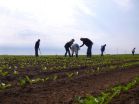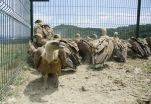Developmental psychology: Sharing doesn't hurt
2015-05-19
(Press-News.org) Preschoolers already recognize what it feels like to be left out when goodies are being shared. In a new study, Researchers at Ludwig-Maximilians-Universitaet (LMU) in Munich show that 3-year-olds can anticipate negative feelings in others, and adjust their own behavior in response.
Why are we willing to share with others what we could just as well keep for ourselves? Willingness to allot a portion of a coveted resource to someone else is a behavioral pattern that can throw light on the origins and development of prosocial modes of response during childhood. In a new study, LMU's Markus Paulus (Professor of Developmental Psychology and the Psychology of Learning in Early Childhood) and Professor Chris Moore of Dalhousie University (Halifax, Nova Scotia) have now shown that whether or not preschoolers choose to let another child partake of a valued commodity that they control depends on how well they can anticipate how that child is likely to feel should they decide not to do so. The results appear in the online edition of "Social Development".
The authors of the study asked pre-school children of different ages to imagine how they feel, or another child would feel, depending on whether someone shares with them or not. It emerged that their understanding of what it feels like to be left out when everyone else has received his or her share not only differs from one individual to the next, it also has an impact on their readiness to share with others in their turn. "The children who had a greater awareness of how badly one feels when others fail to share with one were more generous in a subsequent resource allocation task."
Learning to be generous
The study involved 82 participants between the ages of three and six years, who were divided into three groups. The children in the first group were individually asked by the experimenter to think about how they feel when another person shares things with them or not, and to rate their emotions using a set of pictures showing a range of sad-to-happy facial expressions. The members of the second group were asked to imagine what another child might feel in the same situation. The children were then given colored stickers to share with each other and with another child (represented only as a picture). The responses of the two groups in the resource allocation task were then compared to those of a control group, consisting of children who had been asked simply to infer another's child's state of knowledge in a situation without emotional overtones.
"A heightened awareness of the emotional consequences of being shared with, or not, has an influence on one's own generosity," says Paulus. "The children who had been encouraged to think about the emotions associated with being left empty-handed when some resource has been allocated to others proved to be more generous than those in the control group." Moreover, anticipating -- and wishing to avoid -- the disappointment caused to another child by being left out was a stronger incentive to generosity than the idea of making the recipient happy. "One possible explanation for this is what is called 'negativity bias', which implies that our behavior is more strongly influenced by the desire to avoid negative emotions then by a wish to provoke positive ones," Paulus adds.
The study also showed that even three-year-olds were capable of anticipating what another might feel if ignored in a round of sharing. The degree to which this capacity was present varied between individuals in all age groups tested. Learning in the first two or three years of life is very strongly influenced by our emotions. Studies done by others have, for example, indicated that children whose parents talk to them about feelings are better able to anticipate another child's emotional state, says Paulus. His own latest work shows how one can foster children's readiness to share with others: "It helps if one makes clear to them what someone else feels when left out."
INFORMATION:
ELSE PRESS RELEASES FROM THIS DATE:
2015-05-19
TAMPA, Fla. -- Cells within a tumor are not the same; they may have different genetic mutations and different characteristics during growth and throughout treatment. These differences make treating tumors extremely difficult and often lead to tumor recurrence dominated by more aggressive tumor cells. Moffitt Cancer Center researchers are using mathematical modeling to characterize these differences within a tumor and hope that the results of their latest study will lead to better therapeutic treatments.
"Many tumors exhibit different metabolic behaviors compared to normal ...
2015-05-19
Researchers at the University of Warwick have found a significant link between the presence of persistent nightmares in childhood and psychotic experiences in later adolescence.
In a new paper published in the British Journal of Psychiatry, a team based at the Division of Mental Health and Wellbeing at Warwick Medical School at the University of Warwick found that persistent childhood nightmares both at an early age (between 2 and 9) and at age 12 were significantly associated with new incidences of suspected or definite psychotic experiences at age 18.
The University ...
2015-05-19
Escherichia coli O104 is an emergent disease-causing bacterium various strains of which are becoming increasingly well known and troublesome. The pathogen causes bloody diarrhea as well as and potentially fatal kidney damage, hemolytic uremic syndrome. Infection is usually through inadvertent ingestion of contaminated and incompletely cooked food or other materials, such as animals feces.
Escherichia coli is a so-called gram negative bacterium, commonly found in the intestine of humans and other mammals. Entero-hemorrhagic strains including O157, O26, O103 and O111 and ...
2015-05-19
The fungi (Rhizoctonia solani) is stealthy blight, becoming visible only shortly before the harvest infesting beets or corn at their roots. The fungal rot begins early in the season, working its way from the inside out, and only becoming visible in the fall, destroying the possibility of a harvest. Year after year crop failures due to attacks by pests and pathogens are reported in the media despite their being treated with pesticides. Crop failure is further exacerbated by pesticide treatments which cause the death of insects such as bees through neonicotinoids. "There ...
2015-05-19
Because of their position on the food chain and their dietary habits, Griffon vultures from the Iberian Peninsula are exposed to accumulation of heavy metals in their tissues. A study benefiting from the participation of the Autonomous University of Barcelona reveals that, due to their diets, wild populations of Griffon vultures in Catalonia show the presence of a high amount of lead, which affects their immune systems and reproductive function.
The population of wild birds is subject to the dangers resulting from the presence of toxic elements in the environment. Even ...
2015-05-19
Scientists from the University of Leeds are investigating whether a molecule usually found in moisturisers and skin creams could improve IVF success rates in the UK.
Embryologists running a clinical trial at the University are investigating whether hyaluronic acid, normally found in beauty products which are designed to maintain elasticity in the skin and keep hair and joints hydrated, helps sperm stick to the human egg when it is released from the ovary.
The hyaluronic acid method relies on picking only mature and fertile sperm that stick to a specially coated plate ...
2015-05-19
Even though much of the population in developing countries is involved in agriculture, food security is virtually out of reach. Often the only resort is to purchase a cow, buffalo, or sheep, to provide a steady supply of fresh milk, a nutritious staple of a daily diet. But how to preserve it safely? Refrigeration and boiling are costly -- and often impossible due to sporadic electricity.
The answers may lie in new Tel Aviv University research published in Technology, which finds that short pulsed electric fields can be used to kill milk-contaminating bacteria. Through ...
2015-05-19
May 19, 2015 - Teens with slower performance on a test of "cognitive processing speed" are more likely to have depression and anxiety symptoms as adults, reports a paper in Psychosomatic Medicine: Journal of Biobehavioral Medicine, the official journal of the American Psychosomatic Society. The journal is published by Wolters Kluwer.
"Adolescents with slower processing speed may be at increased later risk of anxiety and depression," according to the new research by Catharine R. Gale, PhD, of Edinburgh University and colleagues. The results add new evidence that lower ...
2015-05-19
May 19, 2015 - As more infants are born to mothers with dependence on prescription pain medications, the costs of treatment for babies with neonatal abstinence syndrome (NAS) have increased dramatically, suggests a report in the March/April issue of the Journal of Addiction Medicine, the official journal of the American Society of Addiction Medicine. The journal is published by Wolters Kluwer.
"At our institution, costs associated with treating infants with NAS are exponentially higher than the costs associated with infants not affected," write Dr. Kay Roussos-Ross, ...
2015-05-19
This news release is available in German. Diabetes is one of the scourges of modern society, and the number of cases is rising every year. Already, there are over 380 million diabetics around the world. The International Diabetes Foundation estimates that by 2030, over half a billion people will be suffering from type 2 diabetes. Today, Switzerland has more than 430,000 diabetics, 40,000 of them with type 1 diabetes.
What both type 1 and type 2 diabetes have in common is a dying off of insulin-producing beta cells, which are found on the pancreas. This deprives the ...
LAST 30 PRESS RELEASES:
[Press-News.org] Developmental psychology: Sharing doesn't hurt

